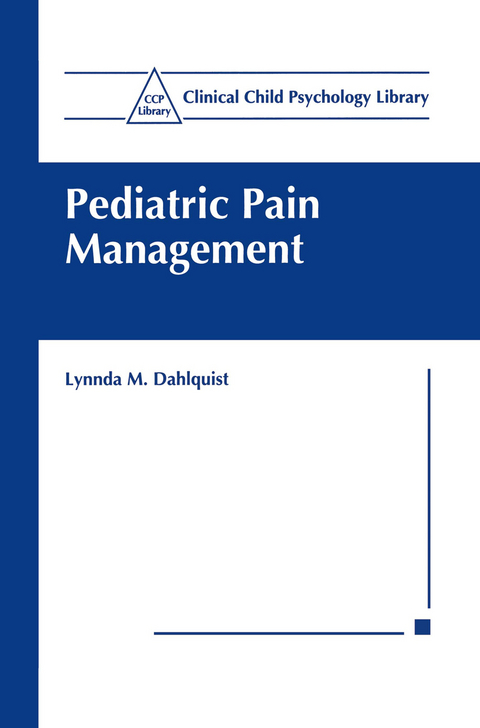
Pediatric Pain Management
Kluwer Academic/Plenum Publishers (Verlag)
978-0-306-46085-2 (ISBN)
What Is Pain?.- Evaluating Pain in Children.- The Hypothesis Testing Model.- Developing an Operational Definition of the Child’s Pain Problem.- The Child’s Perspective.- The Family Context.- The Medical Context in Which the Pain Problem Occurs.- The Social Context.- Generating Hypotheses Regarding Physical Contributors to the Child’s Pain.- Generating Hypotheses Regarding the Child’s Physical Pain.- Generating Hypotheses Regarding Cognitive and Emotional Contributors to the Child’s Pain.- Is the Child’s Attention Focused on the Pain?.- Is Anxiety or Stress Exacerbating the Child’s Pain?.- Does the Child Engage in Self-Defeating Thinking about the Pain?.- Does the Pain Have Significant Emotional Meaning for the Child?.- Is the Caregiver’s Emotional or Cognitive Status Interfering with His/Her Ability to Help the Child Manage the Pain?.- Generating Hypotheses Regarding Behavioral Contributors to the Child’s Pain.- Pain Behavior in Children.- To What Degree Is the Child’s Pain Behavior Positively Reinforced?.- To What Degree Is the Child’s Pain Behavior Negatively Reinforced?.- Is Adaptive Behavior Inadequately Reinforced or Actually Punished?.- Does the Child Lack the Skills Necessary to Perform the Adaptive Behavior(s)?.- Adult Responses to the Child’s Pain.- Developing an Evaluation Plan.- Measuring the Child’s Pain.- Location of Pain.- Intensity of Pain.- Frequency of Pain.- Duration of Pain.- Quality of Pain.- Pain-Free Periods.- Goals of Assessment.- Testing Hypotheses Regarding Physical Contributors to the Child’s Pain.- Is the Child Receiving Less than Optimal Pain Medication?.- Are Medications that Are Likely to Help the Child’s Pain Not Being Used?.- Are Pain Medications Being Administered Inappropriately or in a Less than IdealManner?.- Are Other Physical Factors Exacerbating the Child’s Pain?.- Testing Hypotheses Regarding Cognitive and Emotional Contributors to the Child’s Pain.- Is the Child’s Attention Focused on the Pain?.- Is Anxiety or Stress Exacerbating the Child’s Pain?.- Does the Child Engage in Self-Defeating Thinking about the Pain?.- Does the Pain Have Significant Emotional Meaning for the Child?.- Is the Caregiver’s Emotional or Cognitive Status Interfering with His/Her Ability to Assist the Child in Managing the Pain?.- Testing Hypotheses Regarding Behavioral Contributors to the Child’s Pain.- The Child’s Pain Behaviors and Pain Coping Behaviors.- Adult Responses to the Child.- Case Example.- Treating Physical Contributors to the Child’s Pain.- Problem: The Child Is Receiving Less than Optimal Pain Medication.- Recommend Consideration of a Stronger or Different Medication.- Problem: Other Physical Factors Are Exacerbating the Child’s Pain.- Treating Cognitive and Emotional Contributors to the Child’s Pain.- Problem: The Child’s Attention Is Focused on the Pain.- Problem: Anxiety Is Exacerbating the Child’s Pain.- Problem: The Child Engages in Self-Defeating Thinking about the Pain.- Problem: The Pain Has Specific Meaning for the Child.- Problem: The Caregiver’s Emotional Status Is Interfering with His/Her Ability to Help the Child Manage the Pain.- Treating Behavioral Contributors to the Child’s Pain.- Provide a Rationale for Changing Existing Contingencies that the Child and Family Can Understand and Accept.- Define the Target Behaviors.- Problem: The Child’s Pain Behaviors Are Positively Reinforced.- Problem: The Child’s Pain Behavior Is Negatively Reinforced.- Problem: The Child’s Adaptive Behavior Is Punished or Inadequately Reinforced.-Problem: The Child Lacks Skills Necessary to Perform Adaptive Behaviors.- Case Example.- Working with the Parent and the Health Care System.- Problem: The Adult’s Problematic Behavior Is Positively Reinforced.- Problem: The Adult’s Problematic Behavior Is Negatively Reinforced.- Problem: Appropriate Adult Behavior Is Inadequately Reinforced or Punished.- Problem: The Adult Lacks the Skills Needed to Deal More Effectively with the Child.- Implementing the Pain Management Program.- Establish a Therapeutic Contract.- Establish the Immediate and Long-Range Goals of Treatment.- Determine the Means by Which Treatment Efficacy Will Be Measured.- Plan and Implement the Pain Management Intervention.- Conduct an Ongoing Evaluation of Treatment Effectiveness.- Revise the Treatment Plan if Necessary.- Case Example.- Concluding Comments.- References.- Appendix A. Generating Hypotheses/Evaluation Planning Worksheet.- Appendix B. Treatment Planning Worksheet.- Appendix C. Peer Interaction Record (PIR).- Appendix D. Selected Readings.
| Reihe/Serie | Clinical Child Psychology Library |
|---|---|
| Zusatzinfo | XIII, 182 p. |
| Verlagsort | New York |
| Sprache | englisch |
| Maße | 152 x 229 mm |
| Themenwelt | Geisteswissenschaften ► Psychologie ► Entwicklungspsychologie |
| Geisteswissenschaften ► Psychologie ► Pädagogische Psychologie | |
| Medizin / Pharmazie ► Medizinische Fachgebiete ► Pädiatrie | |
| Medizin / Pharmazie ► Medizinische Fachgebiete ► Psychiatrie / Psychotherapie | |
| Studium ► Querschnittsbereiche ► Epidemiologie / Med. Biometrie | |
| ISBN-10 | 0-306-46085-8 / 0306460858 |
| ISBN-13 | 978-0-306-46085-2 / 9780306460852 |
| Zustand | Neuware |
| Haben Sie eine Frage zum Produkt? |
aus dem Bereich


